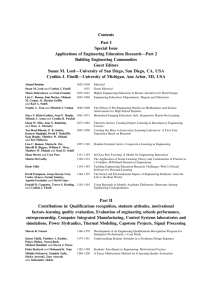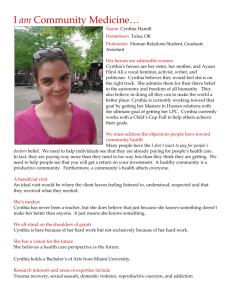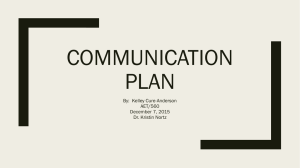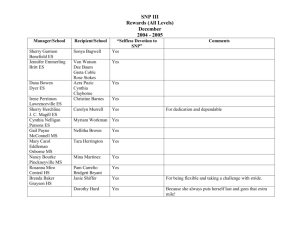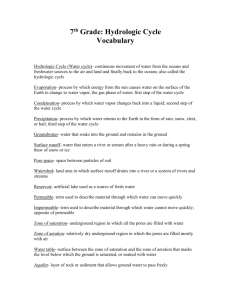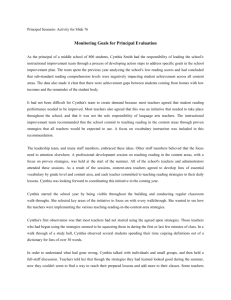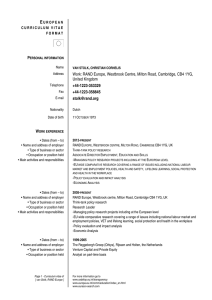Contents Part I Special Issue Applications of Engineering Education Research—Part 1
advertisement
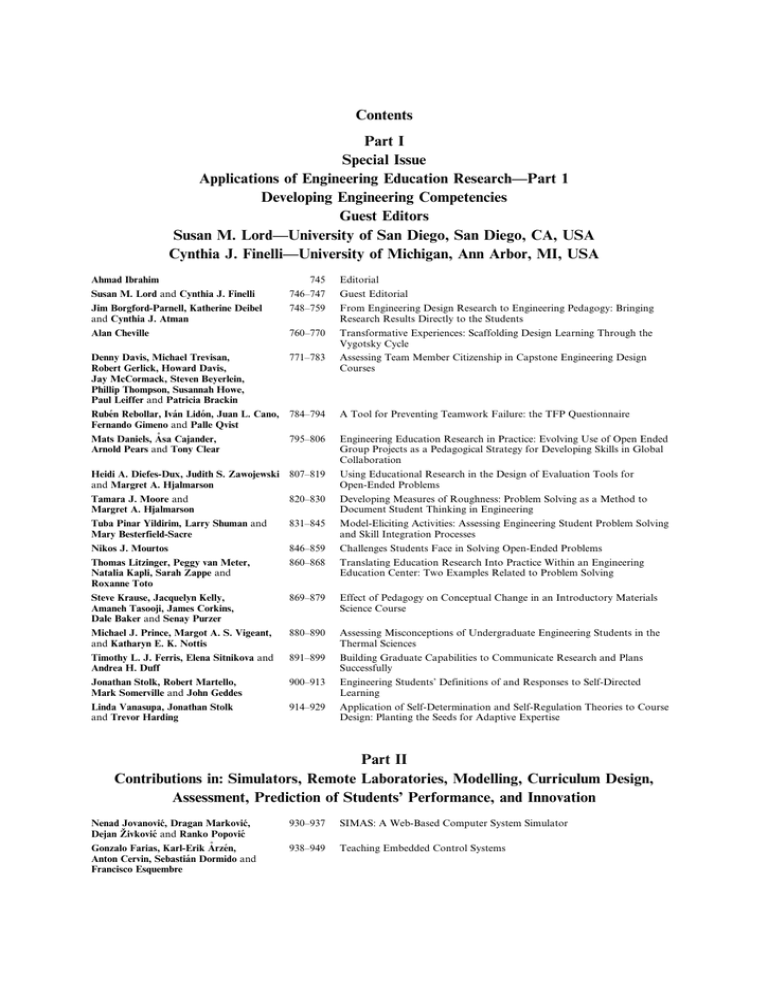
Contents Part I Special Issue Applications of Engineering Education Research—Part 1 Developing Engineering Competencies Guest Editors Susan M. Lord—University of San Diego, San Diego, CA, USA Cynthia J. Finelli—University of Michigan, Ann Arbor, MI, USA Ahmad Ibrahim 745 Editorial Susan M. Lord and Cynthia J. Finelli 746–747 Guest Editorial Jim Borgford-Parnell, Katherine Deibel and Cynthia J. Atman 748–759 From Engineering Design Research to Engineering Pedagogy: Bringing Research Results Directly to the Students Alan Cheville 760–770 Transformative Experiences: Scaffolding Design Learning Through the Vygotsky Cycle Denny Davis, Michael Trevisan, Robert Gerlick, Howard Davis, Jay McCormack, Steven Beyerlein, Phillip Thompson, Susannah Howe, Paul Leiffer and Patricia Brackin 771–783 Assessing Team Member Citizenship in Capstone Engineering Design Courses Rubén Rebollar, Iván Lidón, Juan L. Cano, 784–794 Fernando Gimeno and Palle Qvist A Tool for Preventing Teamwork Failure: the TFP Questionnaire Mats Daniels, Åsa Cajander, Arnold Pears and Tony Clear Engineering Education Research in Practice: Evolving Use of Open Ended Group Projects as a Pedagogical Strategy for Developing Skills in Global Collaboration 795–806 Heidi A. Diefes-Dux, Judith S. Zawojewski 807–819 and Margret A. Hjalmarson Using Educational Research in the Design of Evaluation Tools for Open-Ended Problems Tamara J. Moore and Margret A. Hjalmarson 820–830 Developing Measures of Roughness: Problem Solving as a Method to Document Student Thinking in Engineering Tuba Pinar Yildirim, Larry Shuman and Mary Besterfield-Sacre 831–845 Model-Eliciting Activities: Assessing Engineering Student Problem Solving and Skill Integration Processes Nikos J. Mourtos 846–859 Challenges Students Face in Solving Open-Ended Problems Thomas Litzinger, Peggy van Meter, Natalia Kapli, Sarah Zappe and Roxanne Toto 860–868 Translating Education Research Into Practice Within an Engineering Education Center: Two Examples Related to Problem Solving Steve Krause, Jacquelyn Kelly, Amaneh Tasooji, James Corkins, Dale Baker and Senay Purzer 869–879 Effect of Pedagogy on Conceptual Change in an Introductory Materials Science Course Michael J. Prince, Margot A. S. Vigeant, and Katharyn E. K. Nottis 880–890 Assessing Misconceptions of Undergraduate Engineering Students in the Thermal Sciences Timothy L. J. Ferris, Elena Sitnikova and Andrea H. Duff 891–899 Building Graduate Capabilities to Communicate Research and Plans Successfully Jonathan Stolk, Robert Martello, Mark Somerville and John Geddes 900–913 Engineering Students’ Definitions of and Responses to Self-Directed Learning Linda Vanasupa, Jonathan Stolk and Trevor Harding 914–929 Application of Self-Determination and Self-Regulation Theories to Course Design: Planting the Seeds for Adaptive Expertise Part II Contributions in: Simulators, Remote Laboratories, Modelling, Curriculum Design, Assessment, Prediction of Students’ Performance, and Innovation Nenad Jovanović, Dragan Marković, Dejan Živković and Ranko Popović 930–937 SIMAS: A Web-Based Computer System Simulator Gonzalo Farias, Karl-Erik Årzén, Anton Cervin, Sebastián Dormido and Francisco Esquembre 938–949 Teaching Embedded Control Systems Zhou Rui, Zhou Qingguo, Cheng Guanghui, Wang Baojun, Li Lian and Nicholas McGuire 950–962 An Open Source and Network-based Remote Laboratory for Embedded Systems Amir Aghakouchak and Emad Habib 963–973 Application of a Conceptual Hydrologic Model in Teaching Hydrologic Processes Salvador Perez Canto 974–984 Redesign of Syllabus and Evaluation Procedures to Improve University Teaching in Subjects Related to Industrial Engineering in the Context of the European Higher Education Area J. Peláez Vara, J. Ruiz Calvo, J. V. Martı́n Fraile and F. J. Gómez Gil 985–996 A Pilot Study on the Adaptation of Mechanical Technology Modules to the European Higher Education Area Rubén Fraile, Irina Argüelles, Juan C. González, Juana M. GutiérrezArriola, Juan I. Godino-Llorente, César Benavente, Lui Arriero and David Osés 997–1007 Shaobo Huang and Ning Fang 1008–1017 R. Scott Evans, Luz-Cristal S. Glangchai 1018–1026 and Steven P. Nichols 1027 A Systematic Approach to the Pedagogic Design of Final Year Projects: Learning Outcomes, Supervision and Assessment Prediction of Student Academic Performance in an Engineering Dynamics Course: Development and Validation of Multivariate Regression Models Seeding and Harvesting the Innovation Gap: Linking Technology to Social and Market Needs Guide for Authors
